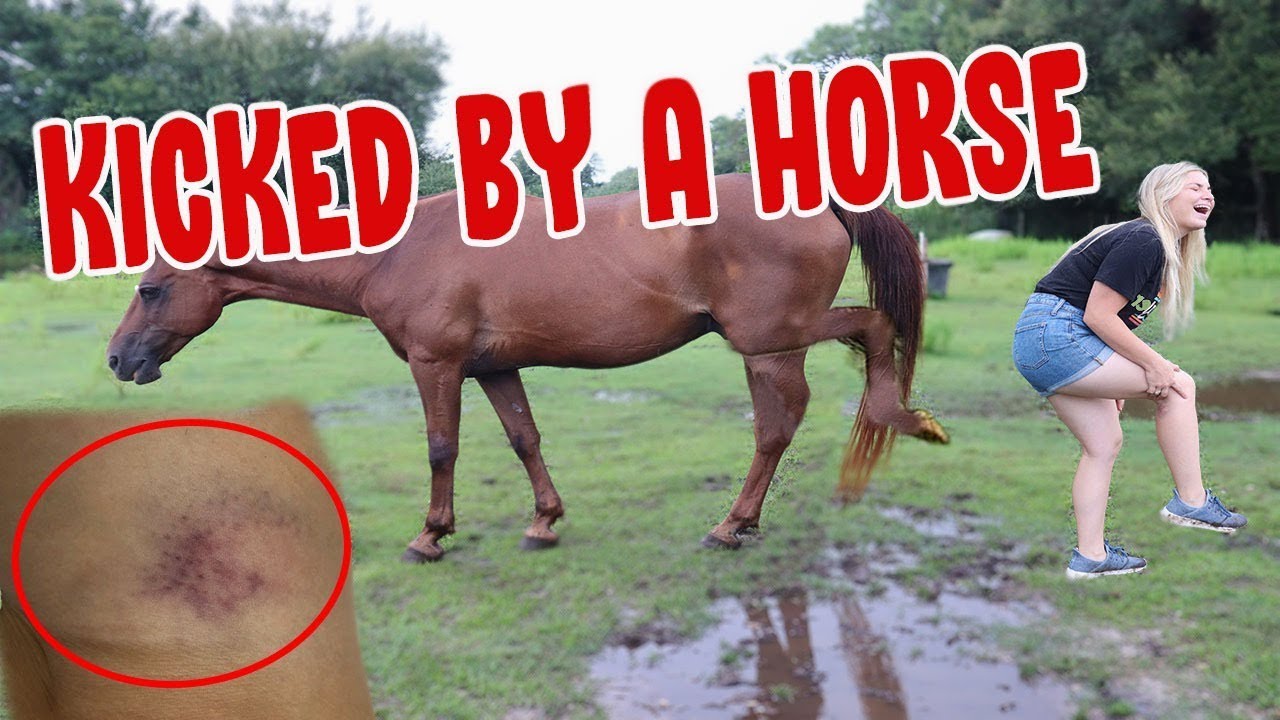
A lot of people are asking how it feels like to be kicked by a horse.
Watched a man kicked by a horse? and want to know what it feels like, then this post is for you.
Maybe you also want to go and get kicked by a horse.
First of all, you need to know the dangers and how it feels like.
How dangerous it could be to be kicked by a horse
The teeth and hooves of a horse serve as its weapons.
Hooves have a limited surface area but are made of a highly hard bone-like material that can break bones when struck with power.
Because the force is focused due to the tiny surface area, many horses will be wearing metal shoes.
In the past, horses were taught to do a ‘flying kick,’ similar to a jump in the air where they kick out their rear legs, in the past.
This is a death-blow maneuver that was meant to be directed towards the head of someone on the ground.
Some horses still do this move as a dressage move today – I’ve seen horses from the Spanish Riding School do it – but it’s now merely a movement and no longer requires the horse to aim for someone’s head.
A human being kicked in the head or in a crucial organ by a horse could be dangerous or leave them brain-damaged or with life-altering injuries.
You might get away with bruising and stiffness if you’re lucky, or if you only get the edge of a hoof rather than the entire force.
But if you’re attacked by a horse instead of getting a ‘warning’ kick, I’m not optimistic about your chances of surviving.
In attack mode, a horse will rear up and strike you with his front hooves; he’ll kick you down, then trample you, leaving you a mangled mess that must be scraped off the floor.
Male horses fight in this manner only when they truly mean it, but in most cases, horses will offer threats and warnings until one party backs off, thus rearing and using front hooves is not very common.
A smaller kick backward by a hind leg is the most usual manner for a human to get kicked.
Because it’s more of a warning kick, it’s less likely to kill you, but it still has the potential to cause injury.
They may kick out if you approach from behind and frighten them, or if you enter their personal space with barking dogs or other horses.
They may kick with one or both legs, and they may turn their bum first.
Walking around the front of horses, where they can see you, is always a good idea, especially if you don’t know the horse well.
And if you notice a horse starting to turn his back on you, get out of the way as soon as you can.
If you’re riding horses together; maybe at the beach, you should keep a safe distance if you’re in the back, as the horse in front will often kick out if their space is invaded.
I’ve seen horses with riders kick each other in the bums, becoming more aggressive and putting riders in danger of being kicked as well.
If this occurs, both riders should focus on getting their horses to move forward and away from one other.
Remember to always maintain a safe distance.
If you know your horse is a kicker, it is customary (at least in England) to tie a red ribbon around its tail at contests to alert other competitors.
I observed an elderly mare, who is a little doddery, kick one of the geldings who was bugging her only a month ago.
It was a ‘warning’ kick, but it was both rear legs kicking out at shoulder height, so she let it wang.
An open wound necessitated veterinarian treatment.
Normally, such a kick would result in soreness and bruises, but not this time.
Horses can be dangerous and even deadly because of their size.
People who have been around horses for a long time may forget this and suffer an injury as a result.
Always treat horses with respect and kindness, and keep their psychology in mind.
If you’re walking across a field with livestock, avoid walking between a mare and her foal.
Also, never feed horses because it may cause them to chase you or start fights between horses, which you may be caught in the middle of.
Horses on Dartmoor have had to be put down because they became more “aggressive” toward humans, yet it was their fault – humans who chose to feed them.
Please try and avoid that.
Oftentimes, if you get kicked by a horse, it will be your fault even though this does not happen every time.
Have you ever been Kicked by horse?
Share your experiences.
